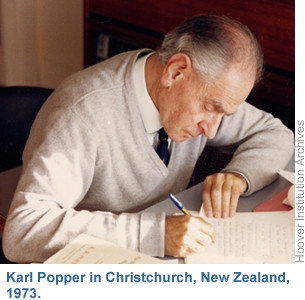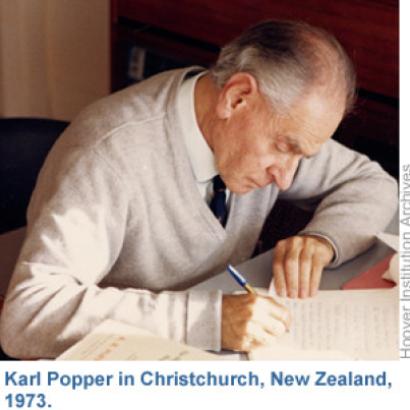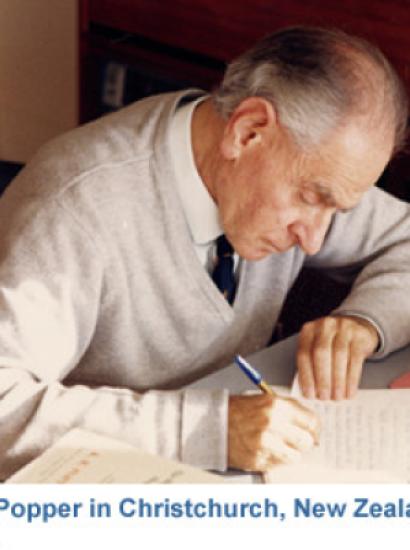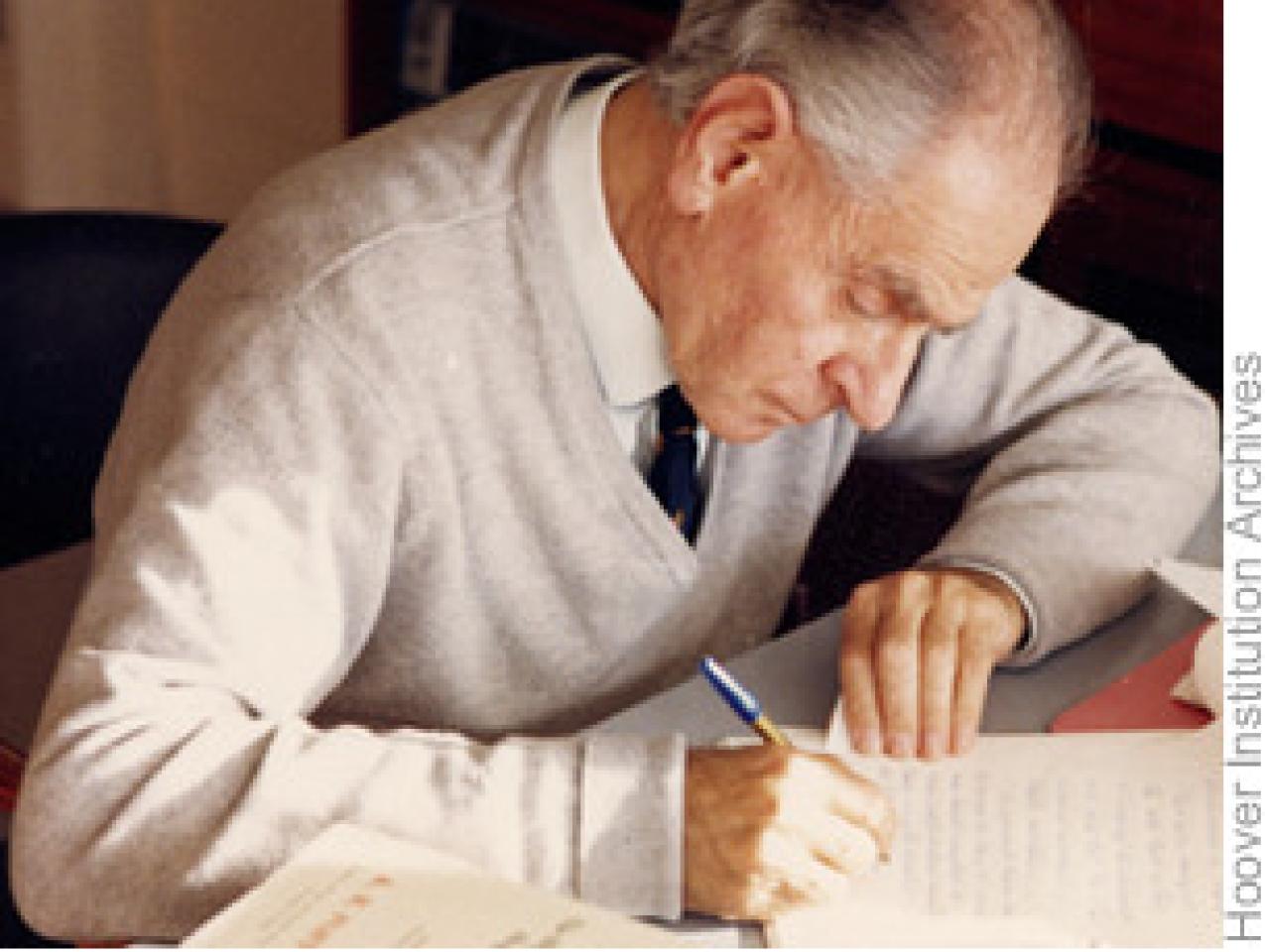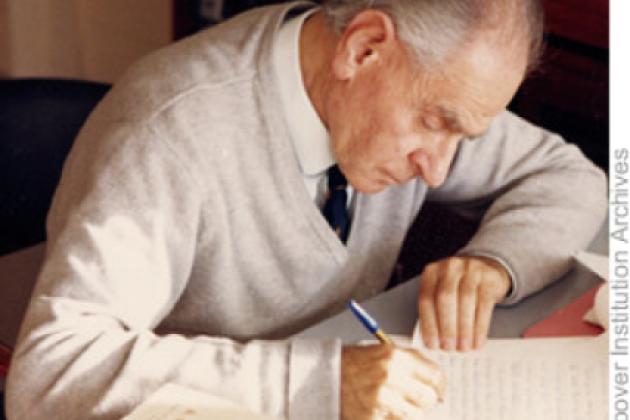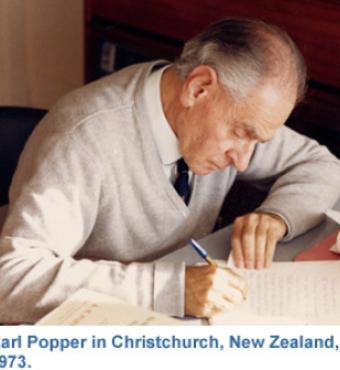- World
- Economic
- Law & Policy
- Civil Rights & Race
- History
The author Bryan Magee has called Sir Karl Raimund Popper (1902–94) “the outstanding philosopher of the twentieth century.” Popper’s papers up to 1985 were acquired by the Hoover Institution while he was still alive, and more of his papers and correspondence became available to Hoover in 2001. Those papers were acquired through the initiative of former Hoover archivist Charles Palm and the late Hoover senior fellow W. W. Bartley III, Popper’s collaborator for 30 years. Bartley was also the first general editor of the papers of the Nobel Prize–winning economist Friedrich Hayek, whose papers are also at the Hoover Archives. Popper and Hayek corresponded at length throughout their lives, and their careers interacted at a key stage of Popper’s career.
The papers, filling 583 boxes altogether, are open to researchers at the Hoover Archives. Several recent books drawing on research in the collection have already contributed to a greater understanding of Popper’s work.
Early Influences
Popper was the son of Dr. Simon Popper, a lawyer, and Jenny Schiff, from a family of prosperous merchants. Both parents converted from Judaism to Lutheranism in 1900. Simon Popper became the law partner of Vienna’s last liberal mayor.
Throughout his youth in Vienna, Popper was surrounded by progressive intellectuals. Briefly a Marxist, Popper became a democratic socialist, but he grew suspicious of socialist planning and utopianism and ultimately became a strong advocate of democracy at a time when that idea was not as fashionable as it is today. In many ways, he moved to the right politically throughout his long life, although one should not conclude that he moved all the way to classical liberalism. As late as 1974, Popper still believed that the state should take a controlling interest in public companies.
After the First World War, Popper’s interest in science grew, which led him by degrees to analyze its philosophy. Working as an apprentice to a cabinetmaker, he obtained a Ph.D. and taught school for several years. Vienna during these years was intellectually fertile ground for the young philosopher. He attended a lecture by Albert Einstein, who discussed the general theory of relativity, and worked as a volunteer in the clinic of Alfred Adler, who became well known for explaining behavior in terms of an “inferiority complex.” Popper also pondered the ideas of Karl Marx, especially as they related to historical inevitability, and became familiar with the writings of Sigmund Freud (whose sister was a friend of Popper’s family).
The most influential group of philosophers when Popper came of age was also based in his hometown: It became known as the Vienna Circle. Although Popper interacted with the group, he was never a member himself. The Vienna Circle promoted the doctrine of logical positivism, which asserted that only logical statements, or those that can be verified empirically, are meaningful. In effect, positivism banished other statements (including metaphysical and religious claims) into the realm of meaninglessness, thus reducing philosophy to logic or science. Popper, who never joined the positivist crusade, refused to dismiss metaphysical statements or religious beliefs as nonsensical.
The Logic of Scientific Discovery
Popper’s ideas about the philosophy of science grew out of his encounters in Vienna with the ideas of Adler, Marx, Freud, and Einstein. He noted that the theories of Adler, Marx, and Freud “appeared to be able to explain practically everything that happened within the fields to which they referred” and that their devotees often experienced what seemed to be a conversion or a revelation, their eyes now open “to a new truth hidden from those not yet initiated.” But with Einstein’s theory, Popper noticed a significant difference. To give the most famous example, Einstein’s general theory of relativity predicted that light from a background star would be deflected slightly as it passed the sun. (Eddington’s expedition to observe a solar eclipse in 1919 confirmed this.) What impressed Popper was the risk involved in such a prediction. If observation shows that the effect is not there, then “the theory is simply refuted” and cannot coexist with certain observations, for they would falsify the theory. Popper concluded that all genuine scientists should be prepared to ask, as Einstein did, “Under what conditions would I admit that my theory is untenable?” In contrast, the theories of Freud, Adler, and others seemed to be “compatible with the most divergent human behavior” and thus difficult or impossible to describe any outcome that might not be seen as having verified them.
And so Popper arrived at his criterion of falsifiability, which distinguishes between theories that are genuinely scientific and those that are not. It is a principle of demarcation between science and non-science. Thanks to the rising prestige of science in the nineteenth century, more and more theories were attempting to gain plausibility and respect by calling themselves scientific—Marx’s scientific materialism, for example. Popper argued that theories framed in such a way that no conceivable observation could falsify them were non-scientific; irrefutability was not a virtue of a theory but a vice.
John Watkins, Popper’s student and then colleague at the London School of Economics, wrote that the principle of demarcation “seems so obvious that one tends to assume that it must have been stated long ago, but I don’t know of anyone who did explicitly state it before Popper.”
Popper made a major contribution in demonstrating the unfalsifiable character of many social sciences, saying they should be regarded as pseudo-sciences or, as he later put it, metaphysical research programs. Science, finally, is not in possession of irrefutable truth, for all theories are tentative and subject to revision. The British physicist Sir Hermann Bondi said that “there is no more to science than its method, and there is no more to its method than Popper has said.”
Popper’s views about the philosophy of science were first published in abbreviated and revised form in German as Logik der Forschung in 1934, which in turn was translated by Popper, with new appendixes, and published in English as The Logic of Scientific Discovery in 1959. At about the same time he wrote a Postscript to that work, which was not published until the 1980s and then in three separate volumes. (The “evolution” of this book highlights the challenge to scholarship presented by Popper’s work. He wrote and then rewrote; new works sometimes remained in his desk drawers for decades before publication; and new editions and translations usually contained revisions.)
A World in Turmoil
In 1934, the Social Democratic Party in Austria was declared illegal and the Nazi takeover was not far behind. Popper, who had been predicting catastrophe, was fortunate to be invited by the philosopher Susan Stebbing to lecture in England. He spent nine months there in 1935 and 1936 and met many leading philosophers, including Bertrand Russell and Friedrich Hayek at the London School of Economics (LSE). In 1937, Popper accepted an academic appointment in Christchurch, New Zealand. At about the same time, he began to write and rewrite drafts of a manuscript first published as “The Poverty of Historicism” in Economica (1944) and later in book form (1957).
The word historicism was unfamiliar prior to Popper’s work. The historicist sees history as a river “coming down from its source, and he believes he can see where it is going next,” Popper wrote. An “indeterminist,” Popper strongly disagreed. Marx and Hegel were leading historicists, and “progress”—in which nineteenth-century intellectuals invested so much hope—is a historicist idea. Malachi Hacohen argues that Popper’s ideas about historicism were influenced by personal experience—in particular by the failure of leftist and Marxist parties in Vienna after World War I to insist on political reforms when facing right-wing aggression. The Marxists had made the mistake of believing in their own creed. They believed that history would unfold as they believed and desired and so saw fascism as merely a temporary setback. Placing their faith in education, they saw little need for political action. The Poverty of Historicism was dedicated to those “countless men and women” who had fallen victim “to the fascist and communist belief in Inexorable Laws of Historical Destiny.”
When Popper expanded his arguments to include the “totalitarian tendencies” of Plato’s Republic, he found that his manuscript on historicism “grew or exploded, without any plan and against all plans.” He split it off into a new book, The Open Society and Its Enemies, perhaps his best-known work. He called it his war effort. It was completed in February 1943 with the title “False Prophets: Plato-Hegel-Marx.” Pointing to the threats to liberty inherent in utopian planning, it had much in common with Hayek’s The Road to Serfdom but was written before Popper had seen Hayek’s book. The Open Society was published in two volumes in 1945.
Postwar Years and Later Life
Popper returned to England after the war to take up a position that Hayek had arranged for him at LSE. Popper was immediately in demand and that fall, October 1946, he addressed the meeting of the Moral Science Club at Cambridge described in the best-selling book Wittgenstein’s Poker. In the midst of an argument about philosophical problems, Wittgenstein, who did not believe that such problems were real, allegedly threatened Popper with a poker.
John Watkins describes hearing Popper lecture at LSE: “I was riveted. [He] had no notes or other paraphernalia. Ideas seemed to flow from him. His combination of seriousness and lucidity had an almost hypnotic persuasiveness. There were happy improvisations and touches of humor.” Watkins noted that “giant-slaying was a persistent motif” in Popper’s work, citing his critiques of Plato, Hegel, Marx, and Freud.
Promoted to professor at LSE in 1949, Popper was invited to give the William James Lectures at Harvard in 1950. After the Cold War began, Popper went through a “mood of depression” and began to think he may have been too optimistic. But the mood passed, he wrote in 1950, largely as a result of his visit to the United States. He liked what he saw of America, returned several times, and always defended it against European critics.
At Harvard he was paid what he called “Hollywood rates” (ten lectures at $600 each); with the proceeds he bought a Bechstein piano and a house in Buckinghamshire, between London and Oxford, where he spent more and more of his time. After his wife, Hennie, died in 1985, he moved to another secluded house in Surrey. He also went up in a glider and bought first editions of works by Galileo, Kepler, Hobbes, Hume, and Kant.
Late in life he became alarmed by the power of television: In their negativism, the media were doing “great harm” and hastening the “moral corruption of mankind.” “The truth is that we in the West live in the best world that has ever existed,” he said. The United States was an “unprecedented success.” As to those who cried out for peace, there was no way of achieving it “other than with weapons.” He supported intervention in Bosnia. Sounding more and more conservative, he said that “irresponsible intellectuals have managed to see only evils in our Western world.” No sooner was the Cold War won than they “issued their curses on our wicked age.”
Popper received many honors and awards, and his books were translated into 40 languages. In his old age he had an audience with the emperor of Japan and was sought out by world leaders including Václav Havel, Helmut Kohl, and the Dalai Lama. He remained intellectually active until his death in 1994.
Special to the Hoover Digest.
